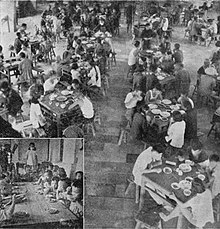People's Commune
The People's Commune ( Chinese 人民公社 , Pinyin rénmín gōngshè ) was a form of agricultural collectivization in the People's Republic of China .
history
After the first agricultural reform approaches in the Jiangxi Soviet and the “liberated areas” in northern China, a land reform was carried out after the founding of the People's Republic of China (October 1, 1949) , in which the “landlords”, who rarely owned more than 10 hectares, took over the land was taken away and distributed among the "poor peasants".
The first collectivization campaigns took place until 1955 , at the same time the state took over the agricultural trade monopoly . In 1956, among other things, the pace of collectivization was intensified within the framework of the 3 Red Banners , all of the farmers' property passed into collective ownership and the farmers were paid exclusively according to the principle of need.
In connection with the announcement of the policy of the great leap forward , even larger production units, the people's communes , were founded in 1957. In the whole of China there were 24,000 people's communes, each of which comprised around 5,000 peasant households and no longer had anything to do with the traditional villages, but instead united a large number of villages. The workforce was administered centrally and divided into work brigades, which were no longer tied to the land they were familiar with. The people's commune should also replace the family as the smallest cell of the community. For this purpose, children and old people were housed in communal facilities and married couples were often separated from one another over a longer period of time. Accommodation and meals took place in sleeping barracks and canteens, household items brought with them were shared among the municipality. At the same time, the people's communes formed the model for the organization of the militia apparatus to be built up alongside the people's liberation army.
The main aim of the policy of the Great Leap was to industrialize the country in the shortest possible time. The people's communes were to play a special role in that they were supposed to produce the industrial base of the country by producing steel in “people's blast furnaces” in order to later supply the consumer industry. This bad planning and the farmers' lack of interest in their work led to a devastating famine between 1959 and 1961.
In 1961, the big jump was canceled after an obvious failure. From 1962, the worst excesses of collectivization were therefore reversed. The land remained collective property , but the farmers were grouped into production groups of around 20 to 30 families who organized their work and distributed the income. They worked about a quarter of the village area and thus restored a certain bond between the farmers and the plaice. The people's communes lost their character as production units; they were now purely administrative units.
With the beginning of the reform and opening policy under Deng Xiaoping after 1978, the end of the people's communes began. In a first step, production contracts were concluded with households in 1978. For this purpose, the soil was divided into groups, each consisting of around 5 to 6 families; they had to deliver a certain quota of their production at a fixed price, but were otherwise free to organize their work. The surpluses could be sold, so that the first free markets arose. In the following years, in 1980, these contracts were no longer concluded with the groups but with the individual families. If it was stipulated in the production contracts which product had to be delivered, the " household responsibility system " switched to giving up the definition of production and any collective payment according to work points and instead leaving a piece of land to the families for use and thus also to them to transfer the risk of profit and loss.
In 1978 the people's communes were dissolved. They were renamed into parishes or divided into several parishes. The land is still formally collective property , but de facto becomes one with the granting of usage rights over 15 or more years, with the tendency clearly towards longer periods, and the tolerance of subleasing and sale of usage rights as well as the construction of residential buildings Privatization carried out, which is also interpreted in this way by the farmers.
literature
- MacFarqhuar, Roderick (1991): Great Leap Forward . In: China: A Cultural and Historical Dictionary. Richmond, p. 121 ff.
